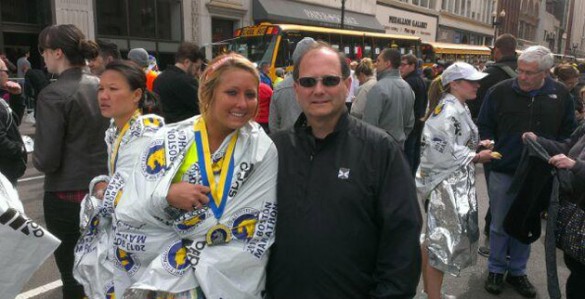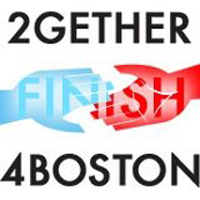
Amanda Hachey crossed the finish line at Monday’s Boston Marathon in four hours, eight minutes. A bit disappointed with her time, she made her way through the three-block-long corral area where finished runners cool down and receive their race medals, fruit and water from volunteers. She was on the phone with her father, who had flown in from Maryland to watch her race, when she heard the first of two loud explosions.
“It sounded like a cannon going off,” remembers Hachey, a research assistant in Vanderbilt’s Mass Spectrometry Core Lab, who initially thought the noise was part of the race celebration. “As soon as I heard it, I stopped and turned back to look.”
All she could see was a cloud of gray smoke rising above the din of racers who trailed behind her. When the second explosion occurred moments later, she made plans to meet up with her father and boyfriend and quickly got off the phone.
Hachey was among the roughly 100 runners from the Nashville area and countless others with ties to Vanderbilt at the Boston Marathon April 15 when a pair of bombs exploded near the finish line, killing three and injuring more than 170.
What followed for Hachey was a prolonged period of confusion: race volunteers speaking animatedly on cell phones, noise and bustle in every direction, police officers ushering people away from the commotion. “You could hear people screaming, but they had been screaming words of encouragement for the runners,” Hachey said. “Then as soon as I met up with my dad and my boyfriend, we heard the sirens and knew something bad had happened.”
It was not until some time later, seated in a restaurant and watching the news on TV, that the group learned the source of the chaos and reality began to sink in.
“[rquote]I missed the explosions by about two minutes,” Hachey said. “But my family and I are OK. Everyone I knew at the race is fine.”[/rquote] Hachey feels grateful, and reflection on Monday’s events has only strengthened her resolve.
“It makes me want to run the race again,” she said. “I know I’m going to. I plan on being there again.”
Soon after the events in Boston, Vanderbilt administrators began reaching out to students, faculty and staff who may have been affected by the incident.
“This may be a difficult time for some of you, whose families and friends may have been victims of this attack and who may be struggling to cope and come to terms with this tragedy,” Associate Provost and Dean of Students Mark Bandas wrote in an email to Vanderbilt students. “Please know that we are here to help you.”
Members of the Vanderbilt community are encouraged to seek assistance from the Psychological and Counseling Center and the Office of Religious Life, whose staffs are available to discuss the tragedy and its aftermath. The Psychological and Counseling Center has support groups available on Tuesday, Thursday and Friday this week on a walk-in basis. Students on campus also are encouraged to reach out to their resident advisers or to contact the Office of Housing and Residential Education for assistance.
In accordance with a national order from President Obama, flags on campus are being flown at half-staff until sunset on April 20 in remembrance of those killed and injured in Boston.
And a Vanderbilt medical student is transforming hurt and frustration over the tragedy into a show of unity and support.
 Michael Casner, president of Vanderbilt School of Medicine’s Class of 2013, is spearheading Finish Together, Finish for Boston, a social media campaign to encourage runners in Nashville’s upcoming Country Music Marathon and Half Marathon April 27 to link hands as they cross the finish line.
Michael Casner, president of Vanderbilt School of Medicine’s Class of 2013, is spearheading Finish Together, Finish for Boston, a social media campaign to encourage runners in Nashville’s upcoming Country Music Marathon and Half Marathon April 27 to link hands as they cross the finish line.
“I think there’s a beautiful symbolism in crossing the finish line with your hands joined with a loved one’s or even a complete stranger’s,” Casner said. “This idea is a way for those of us here in Nashville to show our support for everyone in Boston. There were many Nashvillians running in Boston, and I personally know several doctors who graduated from Vanderbilt and are now working in Boston hospitals.”
As the region’s only Level 1 Trauma Center, Vanderbilt University Medical Center would be the primary medical services provider for a similar mass casualty incident should one occur in Middle Tennessee. Casner said a large group of School of Medicine students plans to volunteer in a medical tent at the Country Music Marathon’s finish line under the supervision of Jim Powers, associate professor of medicine.
“My hope is that this can be Nashville’s way of showing Boston that even if we aren’t there physically, our hearts and thoughts are with everyone affected by Monday’s events,” Casner said.
Now back in Nashville, Hachey plans to attend the Country Music Marathon, though not as a runner this time.
“I plan to go to the marathon and cheer people on, because the crowds in Boston were incredible,” she said.